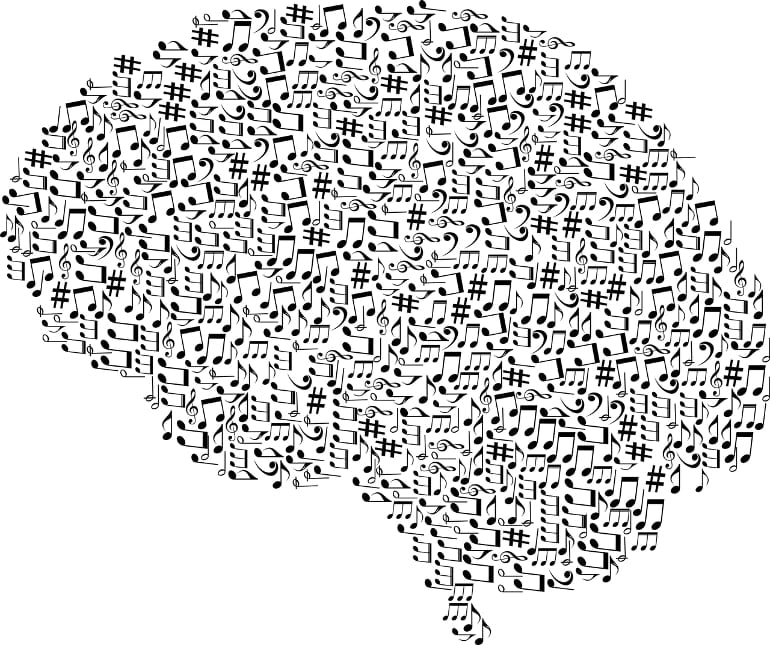Summary: Study provides empirical evidence to show the brain’s predictive ability forms the basis for musical phrasing.
Source: Aarhus University
There is not much evidence for how our brains perceive and decide when ‘something’ – be it a sentence, conversation or piece of music – begins and ends, but a research project from Aarhus University now sheds new light on the role of the brain as a prediction machine.
This comes from a scientific study in which Assistant Professor and AIAS fellow Niels Chr. Hansen documents that research participants experience so-called musical phrases – which correspond to a sentence or ‘unit of meaning’ – as complete and concluded, just as a phrase ends with a tone that creates uncertainty about what is going to happen next. In this way, the brain can effectively save completed phrases in its memory so that it is ready again before a new phrase begins.
The brain is one step ahead and matches expectations
This is to say that the brain is constantly one step ahead and matches expectations to what is about to happen, and according to Niels Chr. Hansen, this challenges previous assumptions that musical phrases first feel finished once the next phrase has already begun. The theory has previously been that the musical ‘units of meaning’ are perceived looking backwards rather than forwards, as the new study shows.
“We only know a little about how the brain finds out where the boundaries are over time – i.e. when things start and end – and here music provides a perfectly delimited domain to measure something that is otherwise difficult to measure, namely uncertainty,” says Niels Chr. Hansen. He is a fellow at the Aarhus Institute of Advanced Studies who is also affiliated with the Center for Music in the Brain. The latter is under the auspices of the Department of Clinical Medicine.
The entropy in Johann Sebastian Bach
He expands further by saying that the international research team behind the study have used computer models to calculate the entropy, which is an expression of the overall disorder or unpredictability in a system, to estimate the uncertainty in the chorale melodies of the German composer Johann Sebastian Bach.

“We clearly see that people have a tendency to experience high-entropy tones as musical phrase endings – and this is basic research that makes us more aware of how the human brain acquires new knowledge – not just from music, but also when it comes to language, movements, or other things that take place over time,” says Niels Chr. Hansen.
On the long term, he hopes that the results can be used to optimise communication and interaction between people – or alternatively, as a tool to understand how artists are able to tease or trick audiences in e.g. film, theatre, music, dance, or literature.
The research findings are consistent with leading cognitive theories, which increasingly view the human brain as a prediction machine. However, according to the research group, this is the first time that empirical evidence has been presented to show that the brain’s predictions form the basis for musical phrasing.
The research results – more information
- In the first experiment, 38 research participants were asked to listen to the chorale melodies by J. S. Bach note by note at their own pace which they determined by pressing the spacebar. Because they were told that they would be tested afterwards on how well they remembered the melodies, the researchers could use the dwell time for each tone as an indirect measure of the participants’ understanding of musical phrasing. In the second experiment, 31 different participants listened to the same melodies and then assessed how complete they sounded. Melodies that ended on high-entropy tones were assessed as more complete, and the participants also lingered for longer on these.
- Important collaborators on the study are Dr. Haley Kragness (University of Toronto Scarborough), Prof. Laurel Trainor (McMaster University), Professor Peter Vuust (Aarhus University), and Dr. Marcus Pearce (Queen Mary, University of London).
Funding: The study is funded by the EU Horizon 2020 programme and Aarhus University Research Foundation.
About this music and neuroscience research news
Author: Niels Chr. Hansen
Source: Aarhus University
Contact: Niels Chr. Hansen – Aarhus University
Image: The image is in the public domain
Original Research: Closed access.
“Predictive Uncertainty Underlies Auditory Boundary Perception” by Niels Chr. Hansen et al. Psychological Science
Abstract
Predictive Uncertainty Underlies Auditory Boundary Perception
Anticipating the future is essential for efficient perception and action planning. Yet the role of anticipation in event segmentation is understudied because empirical research has focused on retrospective cues such as surprise. We address this concern in the context of perception of musical-phrase boundaries.
A computational model of cognitive sequence processing was used to control the information-dynamic properties of tone sequences. In an implicit, self-paced listening task (N = 38), undergraduates dwelled longer on tones generating high entropy (i.e., high uncertainty) than on those generating low entropy (i.e., low uncertainty). Similarly, sequences that ended on tones generating high entropy were rated as sounding more complete (N = 31 undergraduates).
These entropy effects were independent of both the surprise (i.e., information content) and phrase position of target tones in the original musical stimuli.
Our results indicate that events generating high entropy prospectively contribute to segmentation processes in auditory sequence perception, independently of the properties of the subsequent event.






